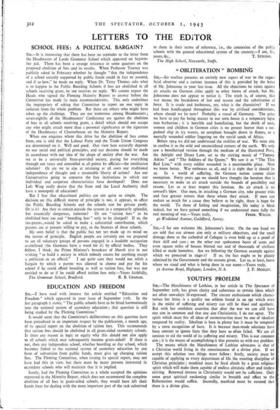SCHOOL FEES: A POLITICAL BARGAIN?
LETTERS TO THE EDiTOR
siR,—It is interesting that there has been no rejoinder to the letter from the Headmaster of Leeds Grammar School which appeared on Septem- ber 3rd. There has been a strange reticence in some quarters on the proposed abolition of fees and its results. When Professor Tawney was publicly asked in .February whether he thought "that the independence of a school entirely supported by public funds could in fact be assured, and if so how," he made no reply. When Dr. Terry Thomas asks what is to happen to the Public Boarding Schools if fees are abolished in all schools receiving grant, he too receives no reply. We cannot expect the Heads who signed the Fleming Majority Report to answer before the Committee has made its main recommendations. This only underlines the impropriety of asking that Committee to report on one topic in isolation from the whole problem. But there are others who might have taken up the challenge. They are not numerous among Headmasters ; seven-eighths of the Headmasters' Conference are against the abolition of fees in all schools receiving grant, a detail which should not escape any who might attach more than a personal significance to the signature of the Headmastts of Charterhouse on the Majority Report.
When one enquires where this drive for the abolition of fees comes from, one is told that the Labour Party and the Trade Union Congress are determined on it. Well and good. Our view here naturally depends on our social and political principles, and our decision should be' made in accordance with our idea of the shape of society after the war. Are we to be a universally State-provided society, paying for everything through our taxes and controlled at all points by officials—the totalitarian solution? Or are we to aim at retaining at all costs our traditional independence of thought and a reasonable liberty of action? Are our Conservatives going to conserve the free institutions in which our individual and corporate characteristics have developed? Does our Left Wing really desire that the State and the Local Authority shall have a monopoly of education?
But I fear that educational politics are not quite so simple. The decision on this difficult. matter of principle is not, it appears, to affect the Public Boarding Schools and the schools run for private profit. Or is it? Are they to remain outside the system in a temporarily splendid,
but essentially dangerous, isolation? Or are "tuition fees" to be abolished here too and "boarding fees" only to be charged? If so, the tax-payers . would be asked to make a substantial contribution, which parents are at present willing to pay, to the finances of these schools.
My own belief is that the public has not yet made up its mind on the matter of principle. English people- are certainly not vet prepared to see all voluntary groups of persons engaged in a laudable occupation assimilated (the Germans have a word. for it) by official bodies. They follow, I think, the Prime Minister's broadcast of March 21st in not wishing "to build a society in which nobody counts for anything except
a politician or an official." I am quite sure they would not relish a bargain by which a parent was allowed to choose and pay for his school if he could afford boarding as well as tuition fees, but was not entitled to do so if he could afford tuition fees only.—Yours faithfully,


























 Previous page
Previous page